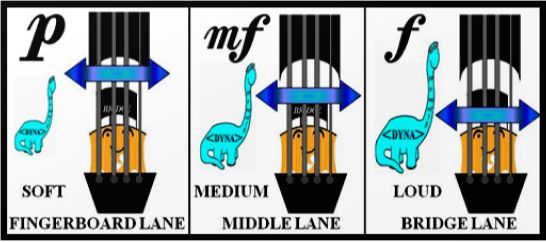BOWING DYNAMICS


DYNA and Bridge are displaying the Three Main Bowing String Lanes above.
Bowing in a specific String Lane, is one of the most efficient ways to create varied dynamics. Here are some others —
Performing near the frog at the Lower Bow-Segment, Sounds Louder.
Since the bow is heaviest at the frog, and your bow-hand is near the contact-point, more potential weight is available at this location.
Performing near the tip at the Upper Bow-Segment, Sounds Softer.
The bow is lightest at the tip and the weight of your bow-arm is further from the contact-point.
Since the bow is heaviest at the frog, and your bow-hand is near the contact-point, more potential weight is available at this location.
Performing near the tip at the Upper Bow-Segment, Sounds Softer.
The bow is lightest at the tip and the weight of your bow-arm is further from the contact-point.
In addition to the String Lane and the Bow-Segment you are bowing, applying more leveraged weight onto the strings increases the volume.
Now’s the time to apply Weight In Motion! It’s time to Bowing Exercise #7

Introducing the Bow Parts of the Bow The Stick Horse-Hair The Tip The Frog The Winding How the Bow Works
Rosin Preparing to Hold the Bow Stick Training Exercises Bowing Terminology Down-Bow Up-Bow
Bow-Hand Set-Up Finger Tasks and Functions The Thumb Meet ARC Finger Segments The Index-Finger
Bow-Hand Pronation The Center-Finger and Ring-Finger Bow-Hand Fulcrum Ring-Finger Propulsion Bass Bows
Pinky Bow-Tasks ‘Casting’ the Bow-Hand Bow-Wrist Tasks Rotational Inertia Arco Clay Smile Exercise Meet ANGLE
The Bow-Arm Box The Shoulder Arc Bow Contact-Point String Lanes Bow-Segment Mastery Bowing Exercises
Finding the Bow Contact-Point “Painting With Sound” Bowing Exercises Menu Bow Taps Bowing Traditions
Perform Down-Bows Perform Up-Bows The Art of the Bow-Change Articulations Staccato Legato
Mastery Checkpoint One Building Bow Control Bow Speed and Bow-Arm Motion Bow Planning and Distribution
Slow Moving Bow Strokes Individual Bow Segments Traveling the Bow Bowing Dynamics Mastery Checkpoint Two
Advanced Techniques Slurs and Articulations Slur Training Locating the Bow’s Balance Point Ricochet and Spiccato
Exploring Ricochet Ricochet Control Spiccato Training Spiccato Control Spiccato Brush Strokes
Multiple String Crossings Virtuosic Bow Strokes Arpeggio Bowing “Flying” Staccato Mastery Checkpoint Three
SCROLL’s List of Bow Strokes
Rosin Preparing to Hold the Bow Stick Training Exercises Bowing Terminology Down-Bow Up-Bow
Bow-Hand Set-Up Finger Tasks and Functions The Thumb Meet ARC Finger Segments The Index-Finger
Bow-Hand Pronation The Center-Finger and Ring-Finger Bow-Hand Fulcrum Ring-Finger Propulsion Bass Bows
Pinky Bow-Tasks ‘Casting’ the Bow-Hand Bow-Wrist Tasks Rotational Inertia Arco Clay Smile Exercise Meet ANGLE
The Bow-Arm Box The Shoulder Arc Bow Contact-Point String Lanes Bow-Segment Mastery Bowing Exercises
Finding the Bow Contact-Point “Painting With Sound” Bowing Exercises Menu Bow Taps Bowing Traditions
Perform Down-Bows Perform Up-Bows The Art of the Bow-Change Articulations Staccato Legato
Mastery Checkpoint One Building Bow Control Bow Speed and Bow-Arm Motion Bow Planning and Distribution
Slow Moving Bow Strokes Individual Bow Segments Traveling the Bow Bowing Dynamics Mastery Checkpoint Two
Advanced Techniques Slurs and Articulations Slur Training Locating the Bow’s Balance Point Ricochet and Spiccato
Exploring Ricochet Ricochet Control Spiccato Training Spiccato Control Spiccato Brush Strokes
Multiple String Crossings Virtuosic Bow Strokes Arpeggio Bowing “Flying” Staccato Mastery Checkpoint Three
SCROLL’s List of Bow Strokes





